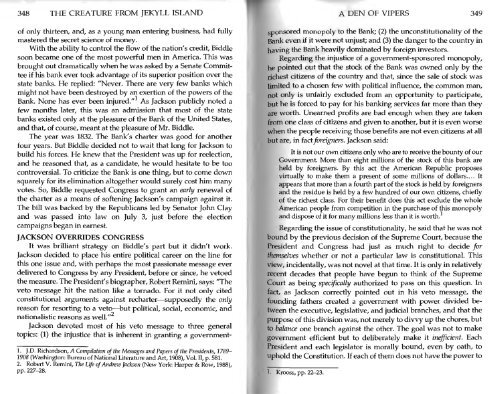Create successful ePaper yourself
Turn your PDF publications into a flip-book with our unique Google optimized e-Paper software.
348 THE CREATURE FROM JEKYLL ISLAND A DEN OF VIPERS 349<br />
of only thirteen, and, as a young man entering business, had fully<br />
mastered the secret science of money.<br />
With the ability to control the flow of the nation's credit, Biddle<br />
soon became one of the most powerful men in America. This was<br />
brought out dramatically when he was asked by a Senate Committee<br />
if his bank ever took advantage of its superior position over the<br />
state banks. He replied: "Never. There are very few banks which<br />
might not have been destroyed by an exertion of the powers of the<br />
Bank. None has ever been injured." As Jackson publicly noted a<br />
few months later, this was an admission that most of the state<br />
banks existed only at the pleasure of the Bank of the United States,<br />
and that, of course, meant at the pleasure of Mr. Biddle.<br />
The year was 1832. The Bank's charter was good for another<br />
four years. But Biddle decided not to wait that long for Jackson to<br />
build his forces. He knew that the President was up for reelection,<br />
and he reasoned that, as a candidate, he would hesitate to be too<br />
controversial. To criticize the Bank is one thing, but to come down<br />
squarely for its elimination altogether would surely cost him many<br />
votes. So, Biddle requested Congress to grant an early renewal of<br />
the charter as a means of softening Jackson's campaign against it.<br />
The bill was backed by the Republicans led by Senator John Clay<br />
and was passed into law on July 3, just before the election<br />
campaigns began in earnest.<br />
JACKSON OVERRIDES CONGRESS<br />
It was brilliant strategy on Biddle's part but it didn't work.<br />
Jackson decided to place his entire political career on the line for<br />
this one issue and, with perhaps the most passionate message ever<br />
delivered to Congress by any President, before or since, he vetoed<br />
the measure. The President's biographer, Robert Remini, says: "The<br />
veto message hit the nation like a tornado. For it not only cited<br />
constitutional arguments against recharter—supposedly the only<br />
reason for resorting to a veto—but political, social, economic, and<br />
nationalistic reasons as well."<br />
Jackson devoted most of his veto message to three general<br />
topics: (1) the injustice that is inherent in granting a government-<br />
1 J.D. Richardson, A Compilation of the Messages and Papers of the Presidents, 1 789-<br />
1908 (Washington: Bureau of National Literature and Art, 1908), Vol. II, p. 581.<br />
2. Robert V. Remini, The Life of Andrew Jackson (New York: Harper & Row, 1988),<br />
pp. 227-28.<br />
sponsored monopoly to the Bank; (2) the unconstitutionality of the<br />
Bank even if it were not unjust; and (3) the danger to the country in<br />
having the Bank heavily dominated by foreign investors.<br />
Regarding the injustice of a government-sponsored monopoly,<br />
he pointed out that the stock of the Bank was owned only by the<br />
richest citizens of the country and that, since the sale of stock was<br />
limited to a chosen few with political influence, the common man,<br />
not only is<br />
unfairly excluded from an opportunity to participate,<br />
but he is forced to pay for his banking services far more than they<br />
are worth. Unearned profits are bad enough when they are taken<br />
from one class of citizens and given to another, but it is even worse<br />
when the people receiving those benefits are not even citizens at all<br />
but are, in factforeigners. Jackson said:<br />
It is not our own citizens only who are to receive the bounty of our<br />
Government. More than eight millions of the stock of this bank are<br />
held by foreigners. By this act the American Republic proposes<br />
virtually to make them a present of some millions of dollars.... It<br />
appears that more than a fourth part of the stock is held by foreigners<br />
and the residue is held by a few hundred of our own citizens, chiefly<br />
of the richest class. For their benefit does this act exclude the whole<br />
American people from competition in the purchase of this monopoly<br />
and dispose of it for many millions less than it is worth.<br />
Regarding the issue of constitutionality, he said that he was not<br />
bound by the previous decision of the Supreme Court, because the<br />
President and Congress had just as much right to decide for<br />
themselves whether or not a particular law is<br />
constitutional This<br />
view, incidentally, was not novel at that time. It is only in relatively<br />
recent decades that people have begun to think of the Supreme<br />
Court as being specifically authorized to pass on this question. In<br />
fact, as Jackson correctly pointed out in his veto message, the<br />
founding fathers created a government with power divided between<br />
the executive, legislative, and judicial branches, and that the<br />
purpose of this division was, not merely to divvy up the chores, but<br />
to balance one branch against the other. The goal was not to make<br />
government efficient but to deliberately make it inefficient. Each<br />
President and each legislator is<br />
morally bound, even by oath, to<br />
uphold the Constitution. If each of them does not have the power to<br />
:1- Krooss, pp. 22-23.


